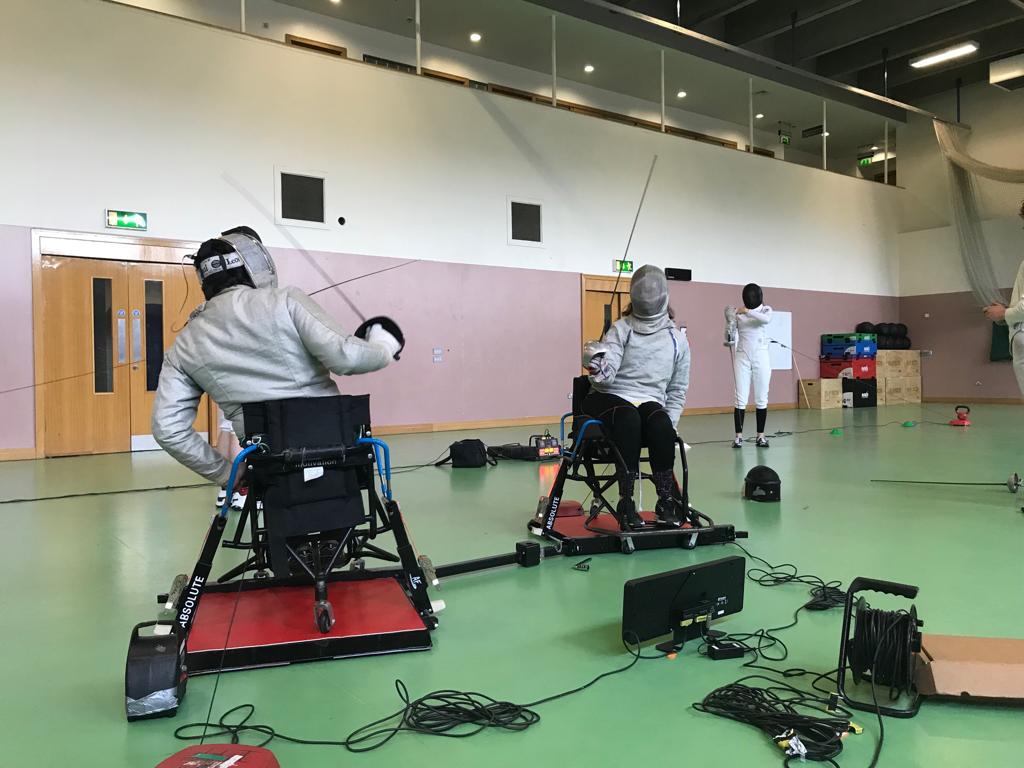You’ve heard of wheelchair basketball, wheelchair rugby and many other paralympic sports, but wheelchair fencing is not something that quickly springs to mind when we think of wheelchair sports. DU Fencing hopes to change this perception with their introduction of wheelchair fencing this year, making them the first fencing club in Ireland to have introduced coaching in wheelchair fencing.
Speaking to Alannah Owens, former Wheelchair Officer for DU Fencing, the origins of the initiative began as far back as 2016. Owens and James Bryant, the captain of DU Fencing at the time, discussed the idea of expanding the club beyond what they were offering in 2016. “There were a number of different things, including getting Fencing on the High Performance Programme, which we have since achieved”, Owens remarked. “Another thing was to see if at some stage the club could offer wheelchair fencing to be completely inclusive and that really sparked my interest.”
“Sport in Trinity isn’t actually very accessible, and inclusive, or equal”
At the time, Trinity only had one other fully integrated sporting society, DU Rifle Club. DU Fencing hoped to emulate their inclusive standards by investing in the equipment to bring everyone to the sport. They hope these moves to bring wheelchair users into the regular sports circle will encourage other sports clubs to do the same. Keeping with Trinity’s Diversity and Inclusion Mission was a driving force behind the success of the initiative. “Sport in Trinity isn’t actually very accessible and inclusive, or equal,” said Owens. “Myself, James and Colm, our coach, looked into it and the barriers to it. The main barrier was the equipment and how expensive it is.”
Ordering from the US proved to be the cheapest solution, but still the money was going to have to come from somewhere. DU Fencing availed of funding made available by the Higher Education Authority who provide money to be used by students for a student initiative. Unfortunately, the nature of administration and bureaucracy meant that the society were left waiting for a while. “We started that process and it was a very long one, it took the guts of two years to get that money,” noted Owens, thinking back on the delays they faced before being able to get to work. “Once it was approved, the money was ours and we were able to start things off.”
The majority of the gear arrived this summer, having been purchased last year. The club currently has the wheelchair frames, which are the most important part of the gear as they act as safety features to keep the chairs secured. DU Fencing also purchased more of their regular gear to ensure that there would be enough jackets and weapons for any new members joining. The chairs themselves are expected to be arriving before the end of term. DU Fencing has also acquired extra equipment, such as scoring boxes, in the hope they can run their own wheelchair fencing competitions and invite other clubs to compete and take part.
“Fencing has always been a university sport… we’d like that other universities would be able to follow the model and bring fencing to everyone in their colleges and make it more accessible,” Owens explained, illustrating how wheelchair fencing would coexist with regular training. “We are one club with an integrated training schedule and training times and integrated people… It has to respond to the individual, every wheelchair fencer will have different capabilities.”
When asked if any wheelchair users had signed up as members, Owens stated: “We don’t have regular attendance at the moment, but people have been getting in contact. We are very much open to anyone who wants to join at any time of the year.”
“Being a fully integrated fencing club will offer new challenges to our able-bodied fencers and ultimately prove their diversity of skills”
Trinity News also spoke to Frances Quigley, DU Fencing’s current Wheelchair Fencing Officer, who commented on the new accessibility measures.
“Sports clubs in college provide not only the amazing benefit of exercise but also the friends and experiences that go along with competing and training in a club. The fact that some people wouldn’t get access to that simply because the equipment wasn’t available seemed completely unfair. Wheelchair fencing is a brilliant workout where rather than using footwork you use your core and upper body to maneuver your body. The real appeal of wheelchair fencing is that its not only for people who are wheelchair bound but is also open to people who are physically impaired. For example if the athlete has cerebral palsy, Spina Bifida or impaired movement, they still qualify for the sport.”
The women’s fencing captain Dearbhaile Collins also stated that “being a fully integrated fencing club will offer new challenges to our able-bodied fencers and ultimately improve their diversity of skills”.






